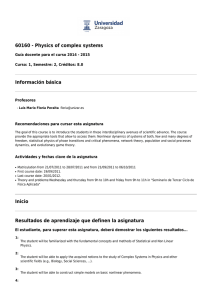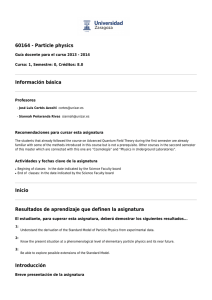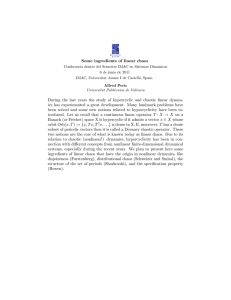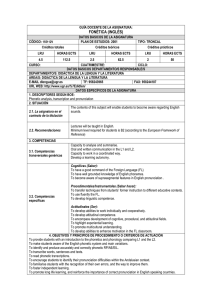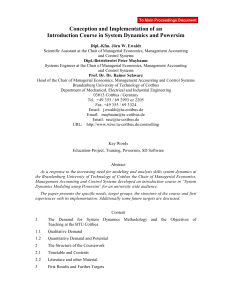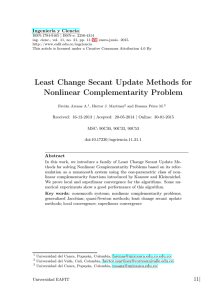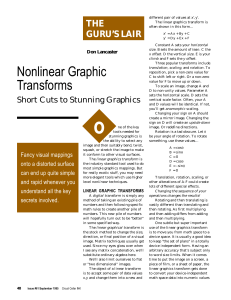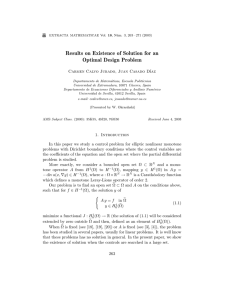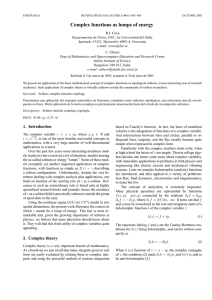60160 - Physics of complex systems Información básica Inicio
Anuncio
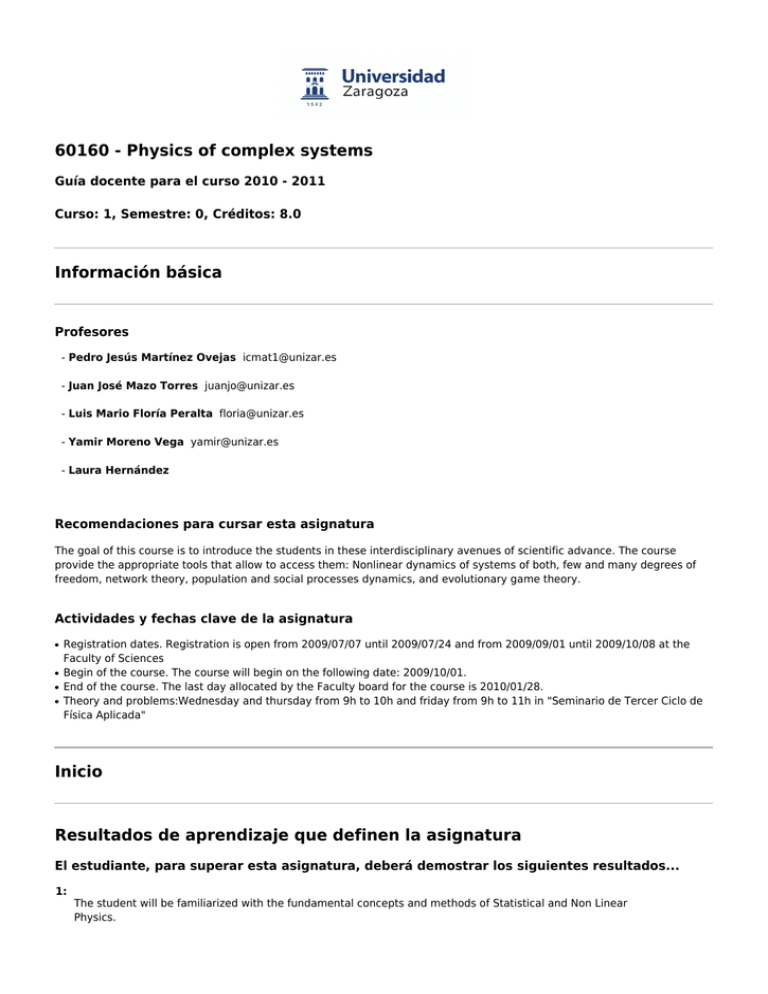
60160 - Physics of complex systems Guía docente para el curso 2010 - 2011 Curso: 1, Semestre: 0, Créditos: 8.0 Información básica Profesores - Pedro Jesús Martínez Ovejas [email protected] - Juan José Mazo Torres [email protected] - Luis Mario Floría Peralta [email protected] - Yamir Moreno Vega [email protected] - Laura Hernández Recomendaciones para cursar esta asignatura The goal of this course is to introduce the students in these interdisciplinary avenues of scientific advance. The course provide the appropriate tools that allow to access them: Nonlinear dynamics of systems of both, few and many degrees of freedom, network theory, population and social processes dynamics, and evolutionary game theory. Actividades y fechas clave de la asignatura ● ● ● ● Registration dates. Registration is open from 2009/07/07 until 2009/07/24 and from 2009/09/01 until 2009/10/08 at the Faculty of Sciences Begin of the course. The course will begin on the following date: 2009/10/01. End of the course. The last day allocated by the Faculty board for the course is 2010/01/28. Theory and problems:Wednesday and thursday from 9h to 10h and friday from 9h to 11h in "Seminario de Tercer Ciclo de Física Aplicada" Inicio Resultados de aprendizaje que definen la asignatura El estudiante, para superar esta asignatura, deberá demostrar los siguientes resultados... 1: The student will be familiarized with the fundamental concepts and methods of Statistical and Non Linear Physics. 2: The student will be able to apply the acquired notions to the study of Complex Systems in Physics and other scientific fields (e.g., Biology, Social Sciences, ...). 3: 4: The student will be able to construct simple models on basic nonlinear phenomena. The student will be able to read and understand review scientific literature in the following subfields: Chaos in dynamical systems, localized excitations, collective phenomena, game theoretical modelling, and complex networks. Introducción Breve presentación de la asignatura The course is an introduction to the subject of Complex Systems, an emerging scientific perspective that tries to overcome the limitations of the traditional reductionist approach that breaks systems into parts and tries to understand these parts. It is recommended to those students who like to improve their modeling skills, want to learn non-linear dynamics and network theory, or are interested in the interdisciplinary applications of physics. Contexto y competencias Sentido, contexto, relevancia y objetivos generales de la asignatura La asignatura y sus resultados previstos responden a los siguientes planteamientos y objetivos: The course in Physics of Complex Systems attempts to deepen students’ education in Statistical and Nonlinear Physics, while introducing some of the most recent research lines in cross-disciplinary Physics of Complex Systems. The goal is to make him familiar with the theoretical concepts and numerical techniques that are employed in this rapidly developing areas of research at the forefront of modern science. At the end of the course, the student should be able to use and apply some of these techniques to real scientific and even practical problems of his interest. Contexto y sentido de la asignatura en la titulación The recent opening of Physics, in particular that of Statistical and Nonlinear Physics, to new lines of interdisciplinary research has paved the way to newly emerged interdisciplines (Econophysics, Sociophysics), it has provided a renewed impetus on Biological Physics, and also important, as a natural feedback from the scientific interaction, this ongoing process may have interesting adaptive, thus wealthy, effects on the very concepts and methods of the physical theories when applied to these wider kind of contexts. This intellectually challenging movement from the community of stat and nonlinear physicists capitalizes on the powerful theoretical machinery of physical sciences to make progress in a large variety of scientific problems traditionally circumscribed to social, economical and biological sciences. Complex systems is today one of the more active research fields in physics. Being an interdiciplinary field is closely related with other subjects studied in the master as "Elements of biological physics" Al superar la asignatura, el estudiante será más competente para... 1: 2: To understand the phenomenology of nonlinear systems. To apply nonlinear dynamics and network theory to systems modeling in physical, biological and social sciences. 3: To present a scientific report to a wide audience. Importancia de los resultados de aprendizaje que se obtienen en la asignatura: The goal of this course is to introduce the students in the interdisciplinary avenues of Physics of Complex Systems. The course provide the appropriate tools that allow to access them: Nonlinear dynamics of systems of both, few and many degrees of freedom, network theory, population and social processes dynamics, and evolutionary game theory. Evaluación Actividades de evaluación El estudiante deberá demostrar que ha alcanzado los resultados de aprendizaje previstos mediante las siguientes actividades de evaluacion 1: Evaluation tests for students who are able to attend the course. 1. Attendance and active partipation in large group activities (15%). 2. Solution (homework) and discussion of proposed exercises (35%). 3. Elaboration of a written report and its oral presentation on an academic project (50%). 2: Evaluation tests for students who are not able to attend the course on site or who fail to go at the first attempt. 1. Personal interview to assess acquired knowledge and skills (15%). 2. Solution (homework) and discussion of proposed exercises (35%). 3. Elaboration of a written report and its oral presentation on an academic project (50%). Actividades y recursos Presentación metodológica general El proceso de aprendizaje que se ha diseñado para esta asignatura se basa en lo siguiente: The results programmed for this course include achieving theoretical expertises in the field of complex systems. In order to get these results, we have programmed activities which improve the students active and continuous implication within the different topics. The course consists of two well separated training activities: theoretical lectures, including problem discussion and resolutions; and elaboration of a project, to adquiere an advanced knowledge of one of the topics of the subject. Actividades de aprendizaje programadas (Se incluye programa) El programa que se ofrece al estudiante para ayudarle a lograr los resultados previstos comprende las siguientes actividades... 1: 2: Large group lectures (30 hours) Small group sessions on exercises (15 hours) 3: The rest of credits are assigned to student's personal study, work on solution of proposed exercises, elaboration of the report and preparation of its oral presentation, and tutorials with lecturers. Planificación y calendario Calendario de sesiones presenciales y presentación de trabajos The course will be structured into the following chapters. I Introduction: Brief history of concepts. Modeling and simulation of complex systems. Prof: M. Floría. October 20009. II Nonlinear Dynamics I: Basic concepts of nonlinear dynamics of systems with a few degrees of freedom. Fixed points, limit cycles, bifurcations, fractals, chaos, and strange attractors. Prof. J.J. Mazo. October 2009. III Nonlinear Dynamics II: Nonlinear phenomena in many-body systems. Coherent structures, localization, an nonlinear excitations (vortices, solitons, breathers,...). Prof: P.J. Martínez. November 2009. IV Complex Networks I: Structural properties. Prof: Y. Moreno. December 2009. V Collective phenomena: Models of social agents, propagation, synchronization. Prof: M. Floría. December 2009. VI Game Theory: Basic notions and evolutionary dynamics. Prof. M. Floría. January 2010. VII Complex Networks II: Dynamical processes in networks. Prof. Y. Moreno. January 2010. Bibliografía Bibliografía básica de la asignatura ● ● ● ● ● ● ● N. Boccara, Modeling complex systems, Springer (2004) S. H. Strogatz, Nonlinear dynamics and chaos, Perseus Books (1994) O. M. Braun and Y. S. Kivshar, The Frenkel-Kontorova model, Springer (2004) J. Hofbauer and K. Sigmund, Evolutionary games and population dynamics, Cambridge Univ. Press (1998) S. Boccaletti et al., Complex Networks: Structure and Dynamics, Phys. Rep. 424, 175-308 (2006) A. Nowak, Evolutionary Dynamics, Harvard Univ. Press (2006) A. Barrat, M. Barthelémy and A. Vespignani, Dynamical processes in complex networks, Cambridge Univ. Press (2008) Referencias bibliográficas de la bibliografía recomendada
